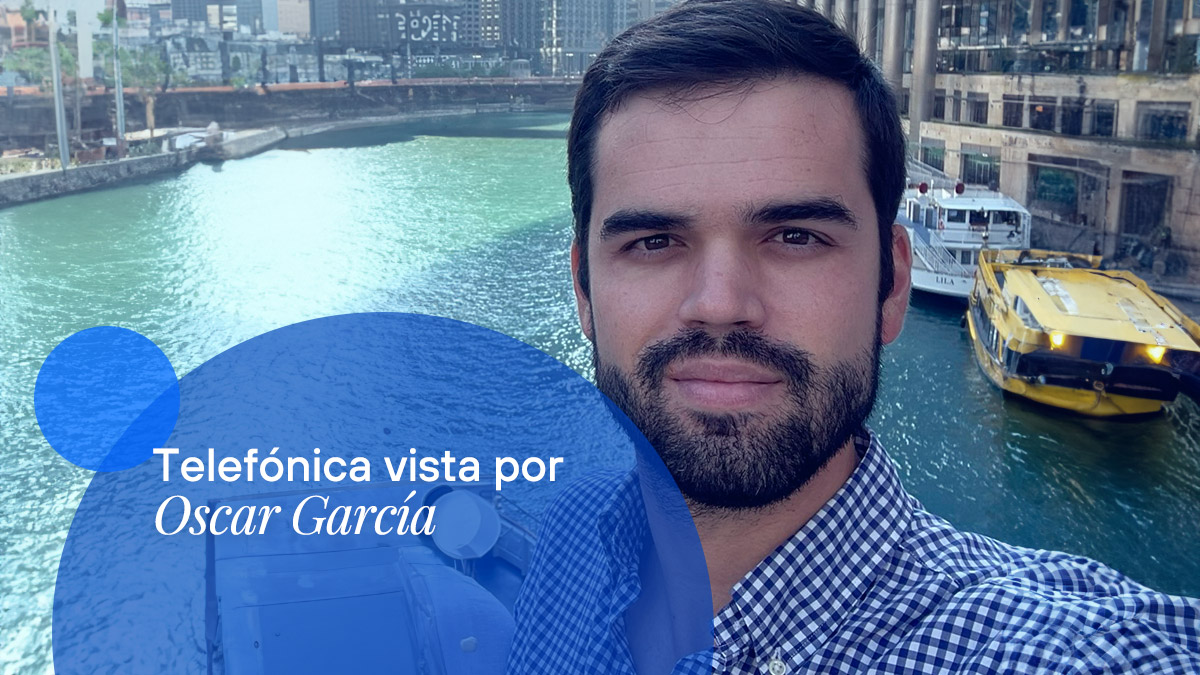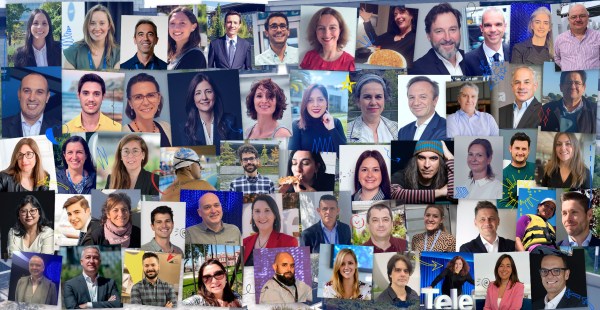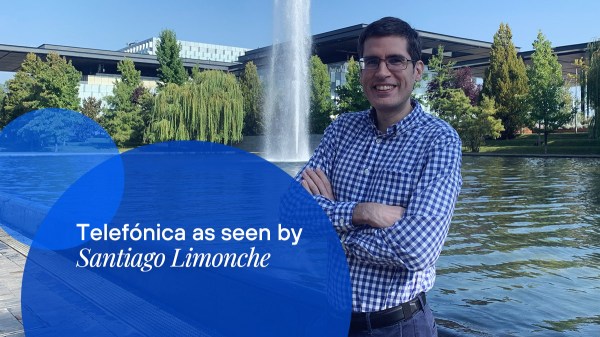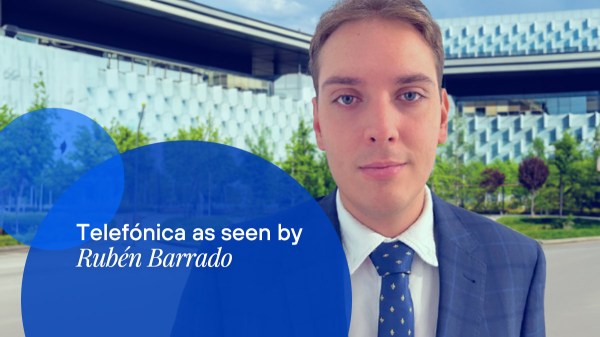How long have you been at Telefónica and what is your assessment of your time here?
I started at Telefónica de España in 2014 for a one-year scholarship from the SEPI foundation, and in July 2015 I joined the staff, in the data platforms and new business engineering team, which at the time was part of the general management of Services and Systems Development.
For me, between the fact that I had only recently left university and that what I had studied had little or nothing to do with telecommunications, the truth is that I had the feeling of entering a completely new world. As I always say when I am asked: I arrived here without knowing what an IP address was.
In engineering, we were dedicated to managing the capacity of value-added services for companies, on two levels: on the one hand, we sized from year to year what the capacity differential was going to be based on business forecasts, on the customer funnel. On the other hand, we also had to foresee obsolescence or architecture evolutions for some important change or to incorporate new functionalities to these services. We budgeted for these needs and executed them in production in the following year, in coordination with other technical groups, suppliers, in parallel with Support and Operations, and upstream with the areas of Service Development, Technology and Marketing.
All this dynamic, working in Telefónica’s ‘service factory’, seeing a bit of economic planning, plant procedures, contact with suppliers, in short, was very useful to me. And of course, I was also lucky enough to be surrounded by colleagues who explained a lot of things to me and with whom it was very easy to work.
In the following years, about a year before the pandemic, we changed roles and put on the cap of end-to-end capacity planners. It was a bit like before, but leaving aside the engineering activity on the plant floor, to put all the focus on capacity management in its different aspects: compute, disk, licences…
And just with the pandemic, in November 2020 and teleworking from home, I ended up in Innovation, which is where I am now. I look back and these almost four years have flown by. What can I say? When I tell them what we do in Innovation, they are surprised and, although it’s wrong to say it, we are a bit envious (the good kind) and I almost always hear ‘what cool things you do there’. As Telefónica is so big and touches so many verticals, I think this carries over to the way we work, so we take on very diverse pilot projects, always working with customers from very different sectors, implementing solutions with them that in the end are new ways of doing things, innovative products, processes or services, and which put the company’s technological capabilities to the test, especially the 5G mobile network. If I had to say it in a few words, I feel very fortunate to be in what I think is the best area of the company.
Is there any project at Telefónica that you feel particularly satisfied with or proud of?
I have several in my head, but I would like to focus on a very recent one, one that we also presented at the last MWC and which will surely ring a bell to anyone who has been following it. The project is a pioneering 3D virtual operating theatre solution in which the different video and audio streams from a real operating theatre equipped with the da Vinci surgery robot can be integrated. It serves to achieve an immersive experience in real time so that expert surgeons, surgeons in training or resident students who cannot physically be in the operating theatre, can connect to this application using virtual reality glasses, a 5G tablet or a PC, and ‘enter’ as remote assistants to the operating theatre during an operation in progress.
This project, without being one of the most complex, seems to me to be a very good example of what we can achieve when we listen to the client, in this case the bariatric and metabolic surgery unit of the Germans Trias i Pujol Hospital, take note of how they work, what their needs are and then try to answer the big question: what can we as a company do to improve training in robotic surgery or collaborative surgeries? The truth is that we are proud to have worked with first-class surgeons, with excellent suppliers such as mSurgery or Abex, to end up testing the results of the project live, in the agora of the Telefónica stand, connecting us in real time to an operation in progress. In the end, you get a first-hand experience of the enormous possibilities that we can enable when we combine our 5G, fibre and Cloud technologies, the knowledge and experience of the customer, and the integration of powerful third-party solutions.
What do you think Telefónica has contributed to society?
I think Telefónica has played and is playing a very important transformational role in society as a whole, both inside and outside Spain. Beyond having connected millions of people, which is not trivial, it has given a very important boost to the digitalisation of society: on the one hand, it has brought new solutions and new technologies closer and closer to people, making them more accessible. In other words, more and more people can do more things thanks to Telefónica, and the project I mentioned in the previous question, which is a small grain of sand, is a perfect example. But on the other hand, and for many years now, Telefónica has also been contributing value to the business sector, responding to the concerns and demands of practically the entire economy.
In essence, I believe that Telefónica, in its hundred years of history, has left its mark on the life of an entire society, improving people’s daily lives, contributing to a more productive economy, one that is capable of doing more with less, and in short, one that can develop to its true potential.
Where do you see Telefónica in the future?
If we look back and try to project the way into the future, what I see is an unprecedented explosion or acceleration of new technologies that open up completely new markets. I’m talking for example about artificial intelligence, quantum computing, or service robotics. I get the impression that, from a relatively few years ago until today, the world has started to turn faster and faster, and is gradually becoming more and more demanding, as we incorporate emerging technological innovations into our lives.
The feeling is that, if you blink, you’re going to miss it, just like in Formula 1. That’s why I imagine Telefónica in this situation of taking the pulse of society, seeing how it breathes every minute, to try to anticipate and be able to respond as it has done up to now to all the new challenges that are yet to come. I see the Telefónica of the future as the Telefónica of the past, aspiring to ever broader and higher goals, to reach more people, more companies, providing great value in new markets or with new services that nobody could have imagined in the past.
Could you live without a mobile phone?
I wish I could live without a mobile phone. I probably could, but I recognise that it would be very complicated. Not only because of the number of tasks we do with our mobile phones, but also because of how internalised it is. The mobile phone is practically an extension of the body. It is possible that it happens to you too, but when I go on a route in an area without coverage, at first I have a strange feeling when every 10 minutes or so I mechanically put my hand in my pocket to look at my mobile, even though I know that you are disconnected from the network. At that moment, and because of the tranquillity of the countryside, which also invites you to live indoors, you become aware of how dependent we are on our mobile phones. You know that you haven’t received any notifications, that there are no new whatsapps, that you don’t have a Teams meeting in 15 minutes, but you continue to keep an eye on your mobile as if you were an ‘automaton’.
In short, I think we should make an effort to be less aware of the world behind the screen and pay more attention to the world in front of it. It sounds like a slogan, but as a teacher of mine used to say, ‘technological detachment’ is as healthy as it is necessary in our daily lives. Let us give ourselves a break.
Help us solve one of humanity’s great enigmas: the potato omelette… With onion or without onion?
Well, look: with onion, lightly cooked, at room temperature and with a slice or two of bread. That’s the benchmark.
Suggest a crazy idea that you would like Telefónica to do on its centenary
It would be nice to be able to do an immersive tour using VR/MR glasses, going through different realistic virtual scenarios of Telefónica from 1924 to the present day. We could visit the first mechanical switchboards, the switchboards, their evolution, also the offices, or the first MWC. Above all, we could see the change. As in the end of the film ‘Lucy’, when you can manage time at will and move to any era, seeing a time lapse of the place in front of you. It would be impressive!
Nominate other colleagues to appear in this section
I nominate my colleagues Juan José Rodríguez Lupiáñez and Ángel Alves












